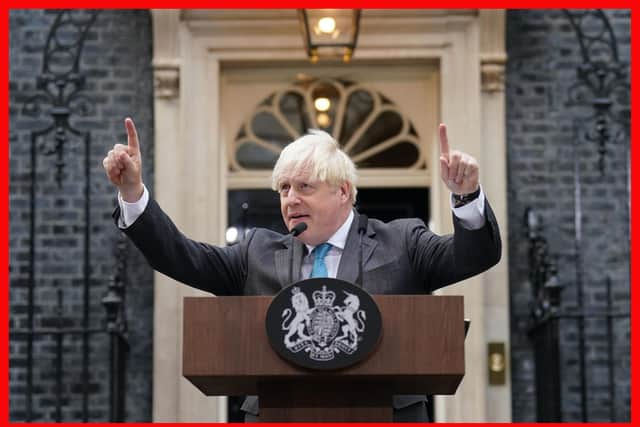Analysis: Boris Johnson's extraordinary reign ends as it started
Full of praise for his time in office and himself, it offered not even a fleeting glance of acknowledgement of the seemingly endless controversies and miscalculation which ultimately cost him the job he had craved since boyhood. No humility and no contrition, only conviction.
Perhaps that was why, initially, he became that rarest of political specimens who can cut through the Westminster noise, and energise people normally far removed from the bubble - as demonstrated by the size - and geography - of his 2019 majority.
Advertisement
Hide AdAdvertisement
Hide AdThe hand he was dealt in the job was not an easy one. The in-tray of the top job seldom is, but his was tougher than average, even his successor’s time could be more pitfall-loaded still.


But much like his predecessor Margaret Thatcher, while he leaves office with ardent supporters and bloodthirsty critics, no one can deny he was a prime minister whose actions changed the country’s direction.
Immediately, there was Brexit - perhaps the reason he got the job in the first place. The work is far from complete, but - indisputably - the UK has left the EU.
Then there was Covid-19. The most significant pandemic in a century, and a challenge no prime minister would ever want to face - effectively balancing human lives against economic cost.
Advertisement
Hide AdAdvertisement
Hide AdThen a brutal war on the continent, sparking a cost of living crisis more severe than anything seen in a generation.
But in the end, it was not the events that cost him what he coveted most, but himself.
The mishandling of what for the more deft of political operators could have been minor hiccups instead created repeated self-inflicted crises eventually morphing into a perma-crisis, starting with his blind support of Dominic Cummings in the Barnard Castle affair and culminating in a painful weekend of ‘mis-rememberings’ over the Chris Pincher incident.
For a man whose relationship with the truth has at times been as wobbly as the protoplasmic jellies he was so fond of referring to, it is fitting his final act contained as many half-truths as it did.
Advertisement
Hide AdAdvertisement
Hide AdTo pick one from many, he claimed to have strengthened the union of the UK. It’s hard to make the case for this being factually accurate, and much easier to argue that the union is shakier now than it has been for generations - the anti-unionist Sinn Fein is the largest party in Stormont for first time ever, Northern Ireland has no functioning administration and calls for a second Scottish independence referendum only look likely to become more vociferous.
He described his own tenure as leaving a foundation of “great solid masonry on which we will continue to build together paving the path of prosperity now and for future generations”.
This statement’s level of veracity perhaps comes down to personal preference and political persuasion.
But with the greatest cost of living challenge in decades and levelling up still a pipe dream, industrial unrest in virtually every sector, a sorely divided party and a ten-point poll gap to Labour, history may deem that masonry less robust than advertised.